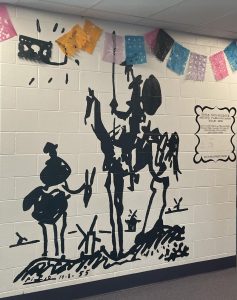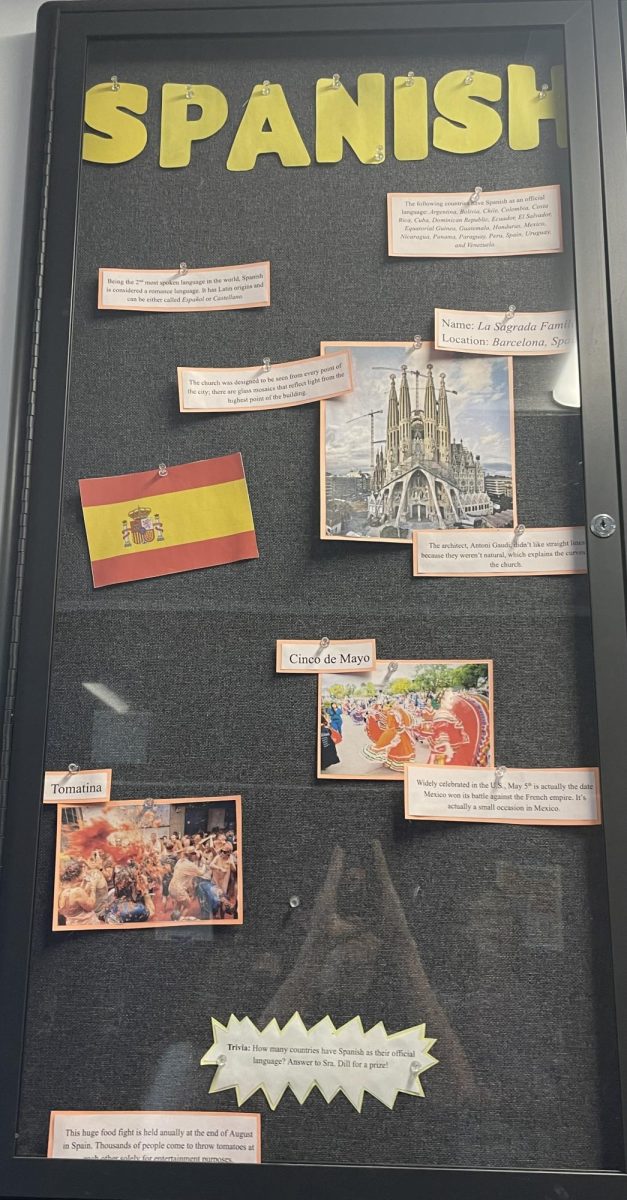Research in an article published by Forbes in 2021 shows that 13% of the population of the United States of America speaks Spanish. Additionally, “The U.S. also has the 2nd largest population of Spanish speakers in the world (Mexico has the largest).”
Over 1/10th of the countries’ population speaks Spanish; it might be time to reevaluate its role in the classroom.
Profesora Lewis: “I think it’s important for kids to understand we ask them to take a language…because we want to see that you can pick an elective and then grow into the advanced levels of that elective.”
Emily Lewis, a Spanish teacher at Arvada West, shares, “I actually don’t think it (Spanish) should be required to graduate from high school, but I do think it should be a requirement for it to get into college or post high school education. That being said, I do find it very important for people to take a language even if you’re not going to go to college.”
While Lewis isn’t of the opinion that Spanish should be required, she does point to the importance of the class, stating, “I think all languages are really useful and applicable in the real world, and obviously it really depends on what you’re going to do, but Spanish in particular is super important.”
She adds, “Even when you’re not speaking to other people, learning another language connects synapses in your brain that aren’t connected in other ways. Math and language oftentimes are associated with how your brain functions and builds connections, and so it allows you to do problem-solving in a different way, it allows you to become more fluent in your own language, and it gives you a different perspective of culture and world.”

Although Spanish can be quite beneficial, a key question to be asked is whether students take the class for the right reason. Lewis explains that, in regards to her class make-up, “fifty percent of my students when asked why are you taking Spanish say that they’re taking it because whoever’s in charge of them made them take a world language.”
She continues, “And then the other forty percent of my students take it out of interest and wanting to learn another language,” while “about ten percent of my students take it just because their counselor put them in it, and they had no say in it.”
However, even with around 50% of students taking Spanish class for reasons other than to learn the language, the entire elective credit the class takes up often wards students off.
“Because Spanish 1 and 2 are offered every single period of the day, and because freshmen and sophomores are required to have seven classes, sophomores I think have to have six, it’s easier for them to fill (Spanish class)…We don’t really see the big impact in Spanish one and two but we see a bigger impact in 3, 4, 5, and AP.”
Lewis ends not with frustration but with a solution, explaining, “Jeffco offers a remote learning option, but you have to be enrolled in it full time, and I think it would be kind of cool if Jeffco or the public library or some kind of public entity were able to offer an online Spanish class where people either paid a nominal fee or it could be free to students who wanted to take it.”

Senora Brettell: “The students who are invested will learn more, use it more often, and therefore have better language skills overall. If you’re going to put it on a resume, you’d better be able to demonstrate ability.”
Karen Brettell, one of Lewis’s fellow Spanish teachers at A-West, picks up where her colleague left off: “While I believe everyone should know how to speak more than one language, I don’t necessarily believe it should be required in high school. I do think it would be better if we were teaching languages throughout K-8 and then students who want to learn more of a language could really do some in depth learning 9-12.”
Brettell understands the value of Spanish, and not just because she is a teacher; she shares, “I have helped translate as far away as Scotland and have used my Spanish in Spain, Costa Rica, Mexico and France. It also helps in understanding other languages when I’m abroad and the way I perceive other languages when they are unfamiliar to me.”
Additionally, Brettell points to the same benefits of learning a language that Lewis shared, stating, “Benefits of learning a language at any time are brain development, increased intelligence, employment and increased awareness of cultures and social structures.”
She adds, “I do believe that learning a language benefits a person in more ways than they can imagine but I’m not sure that requiring a class will create the investment needed for a student to do well with languages.”
However, she does believe that “there is potential value for language requirements if they are long-term. If language was a core subject K-12 our country would be educating our students at a level present in many other countries in the world.”
Brettell concludes, “Personally, I believe students should pursue learning in things that they believe interest them. That is what an elective course is for. If the class was required, I would hope that it would be required before high school as well.”



